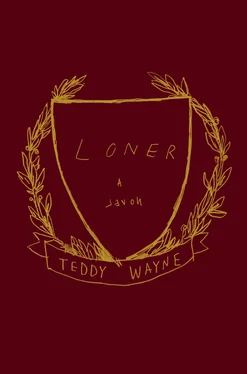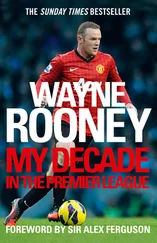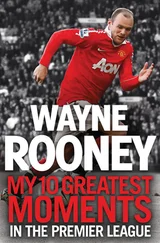Naturally he’d be going to a state school.

I received back my graded “I’m Nobody! Who Are You?: The Self as Staffage in Emily Dickinson” essay. The sentences were massacred with red ink. “Some interesting insights, but an incoherent argument,” my TF had written on the last page. “B—.”
My first B. Not just at Harvard (where I’d been pulling off As and A minuses), but in my entire academic career. I’d rather have gotten an F. Absolute failure could be indicative of unappreciated genius. Mediocrity wasn’t.
It was because I’d put all my best thinking into your paper. Fortunately, there was still the final essay. This time I’d prioritize my own work to prove that the B minus was a fluke, that I was indeed one of the most gifted students Mrs. Rice had encountered in her twenty-four years teaching English at Garret Hobart High. I decided to write about the troika of The Sun Also Rises, The Great Gatsby , and the course’s namesake poem, furiously banging out pages of shorthand ideas about Europe and America, old money and new money, gentiles and Jews, the plainspokenness of Hemingway as masculine cover for his cerebral vocation, Fitzgerald’s lyricism and Eliot’s classicism as a doubling down on their effeteness.
But when I tried to compose the first draft, I struggled to transform my notes into a coherent argument, let alone a cogent, nuanced one executed in a fancy prose style. To procrastinate, I ended up translating the complete document of stray thoughts in reverse. I encountered a similar block for my other classes’ essays, too. All I could think about was how, once I saw you again, we would pick up on what we’d done that night in my room.

I roamed around the River Houses one night until I heard the sounds of a party. I waited until a resident opened the door, followed the music, and entered the congested suite. There wasn’t anyone I recognized. I stood by the alcohol, refilling each cup as soon as I’d emptied it, and stayed till the end. No one spoke to me.

Reading week was drawing to a close and you hadn’t reached out yet to schedule our next session. I e-mailed you:
Just checking in about when you wanted to work on our Prufrock essays together. I’m free whenever.
I stayed up until four in the morning waiting for your reply. It wasn’t there when I awoke at noon, either. Maybe you were neglecting your in-box as you took care of finals. Nonetheless, it was inconsiderate. I was offering my services; you could at least have had the courtesy to tell me when you were available.
I needed to run into you on campus. But I hadn’t seen you in the dining hall the whole week, and I couldn’t stand by your room, obviously. I would have to intercept you before or after one of your exams.
I checked the syllabus for Gender and the Consumerist Impulse. In lieu of an exam was a final paper (the “anthropological study requiring local fieldwork”) due in your professor’s mailbox that day by five o’clock. It was already 2:30 but, knowing you, you’d hand it in under the wire; I could linger by the mailboxes, pretending I was there for some other purpose.
I jogged over to Boylston Hall, found the correct mailbox, and sifted through the essays to confirm that yours wasn’t there yet. But it was — near the top of the stack:
A QUID PRO QUO:
A Market-Based Study of Fe(male) Sexual Transactions
by Veronica Wells
If only I’d remembered the syllabus an hour earlier, I would’ve been there when you dropped it off. The one consolation was that I could now read what you’d written: “sexual transactions” sounded intriguing.
Students and faculty trickled by, all consumed with their own urgent end-of-semester business. I snatched the paper and hurried downstairs to the basement, avoiding the dangerous space of the BGLTQ lounge, and cloistered myself in a stall in the men’s room.
“If love does not know how to give and take without restrictions, it is not love, but a transaction that never fails to lay stress on a plus and a minus.”
— Emma Goldman, “The Tragedy of Woman’s Emancipation” (1906)
Introduction
Though Hollywood would have us believe that all we seek in romantic relationships is love, it is just one of several exchangeable commodities, along with sex, money, status, validation, services, and so on. While I have long been aware of — and troubled by — the transactional nature of relationships, I have been as susceptible to this dynamic as anyone else.
On September 4, I became acquainted with a male member of Harvard’s senior class (“Alpha”). There was a mutual attraction and we began dating. Within a few weeks, the terms of the transaction were glaringly apparent. Aware of his high market value in the heteronormative undergraduate social economy, Alpha conducted himself in a manner suggesting that his status and finances would satisfy all my relationship needs.
They did not; I found the relationship lacking in several crucial respects. Rather than extricate myself, however, I decided to study it through an anthropological and economic lens. As part of this exploration, I have included a log of our noteworthy interactions, the money Alpha spent on me, and our sexual encounters (intercourse, fellatio, and/or cunnilingus). An annotated analysis of the transactions composes Part 2 of this study, in which I consider which commodities influence the power dynamic of a relationship; how each partner calculates the costs and benefits of a given transaction; and the transactional relationships among money, sex, and status.
Part 1: Beta
A few days into my study of Alpha, I became acquainted with a freshman male (“Beta”). On October 5, he offered to help me work on an essay due in a class we shared. I realized that I did not have a comparison subject for Alpha, who was receiving various commodities from me, just as I was from him. What if I entered into a Platonic relationship with a lower-value male that exclusively benefited me? To what lengths would Beta extend himself for the presumptive possibility of sex? How might it refract the power dynamic between Alpha and me?
I expanded the ambit of my study to include Beta. With no suggestions on my end of sexual reward, he voluntarily wrote two essays for me in clear violation of the Honor Code.1 Despite the fact that we were not in a sexual relationship, Beta began to act in much the same entitled, possessive manner as Alpha, subjecting me to disturbing levels of surveillance in a number of episodes. A more thorough examination of our relationship is in Part 3.
Beta’s behavior in the early stages made me uneasy, and I attempted to end our association prior to the second essay he wrote for me; in spite of this, he was adamant about maintaining it. But after an incident in which he followed me around New York City, I felt unsafe in his presence and withdrew from him before his expectation of sex became unmanageable.
1 I wrote my own papers before our meetings and did not, of course, submit either of his, which suffered from retrograde ideas and stilted prose, as if he thought he could browbeat me into admiring submission with overwrought sentence constructions and baroque vocabulary.

Insert an empty page for my restroom-stall silence, printer.
My thighs atrophied. I sat down on the toilet seat before reading the rest, which was more of the same. Then I reread the whole thing. Each time my eyes passed over the word Beta , it was as if an organ were surgically extracted from me without anesthesia and deposited on the operating table so I could witness my own vivisection.
Читать дальше














